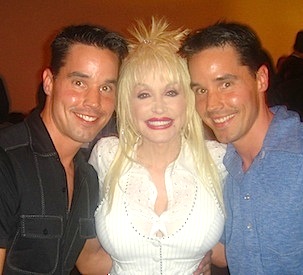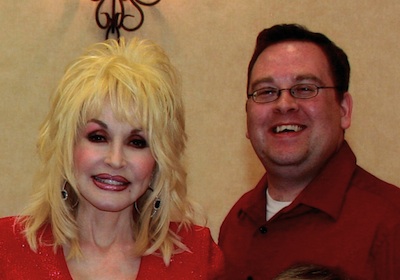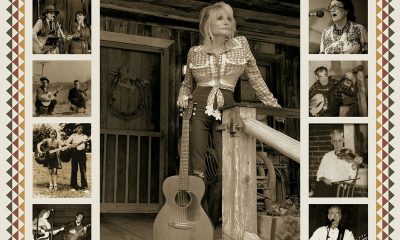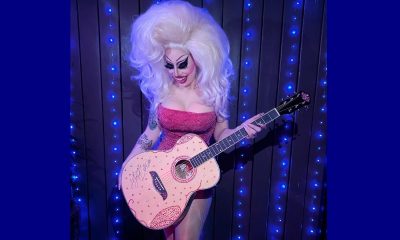Miscellaneous
Fans of many colors
Dolly Parton has always embraced her gay devotees, even before it was trendy
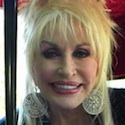
When it comes to singers with huge gay followings, Dolly Parton has one of the most loyal — and most rabid.
Dolly obsession, explored memorably in the 2006 documentary “For the Love of Dolly,” is at fever pitch these days. The 65-year-old country/pop singer released her latest indie album, “Better Day,” last month and is just starting her latest road outing, the “Better Day World Tour,” which will find her playing dates throughout North America, Europe and Australia. She comes to the D.C. area this weekend with a Sunday night sold-out show at Wolf Trap (wolftrap.org). She’s earned solid reviews for both the new record and the tour’s first shows in her native Tennessee and last weekend at the Hollywood Bowl. (The D.C. stop presents a dilemma for some gay music lovers — Britney is at the Verizon Center the same night.)
Everybody knows gay men love their divas — Cher, Judy, Barbra, etc. — but how has Dolly managed to be the only country singer to attain that level of adulation? We talked to three of her LGBT fans from wildly different walks of life to find out.
Duane Gordon, a 36-year-old gay Jackson, Miss., native now living with his partner in Middletown, Ohio, was entranced with the singer even longer than he can remember. His parents tell him when he was as young as 1 and 2, he would drop everything to stare enthralled at the TV anytime Dolly was on. When Barbie-sized Dolly dolls were issued by Goldberger in the late ‘70s, Gordon begged for one. His parents refused, though they didn’t otherwise discourage his infatuation.
He taught himself to read looking at lyric sheets from Dolly’s albums, which he played on his plastic toy kiddie turntable. At age 3, she was his first concert. His whole family went. His mom says the only time he moved the entire evening was when she took him toward the stage to hand the singer a rose.
“I think she’s always appealed very strongly to children,” he says. “It’s probably the high-pitched voice, the exaggerated appearances. She describes herself as a living cartoon character and I think once you become a fan as a child, it’s kind of imprinted on your brain and you remain a dedicated fan. Almost every really big fan of hers I know became a fan as a child.”
Gordon never outgrew it. He got all her new albums as soon as they were released and when he was 13 and 14, he started trolling vintage record shops for her original vinyl releases. By now, he has them all. The only vinyl issue he lacks is her rare first single “Puppy Love.” When originals show up on eBay, they usually sell for between $2,000-$3,000.
As soon as Gordon got online in the mid-‘90s, he started seeking Dolly fan sites. She had no official site (though she does now) and he soon realized he could do as good a job as those that existed. It debuted as Duane’s Dolly Pages in 1996. By 1998 it became Dollymania (dollymania.net) and is the oldest continually operating Dolly site and the most updated of any. He spends at least an hour each evening keeping it fresh almost every day except Sundays. For several years in the early ‘00s, Dolly and her then-label Sugar Hill, for whom she released several bluegrass records, used it as their “unofficial official” site, sending Gordon exclusive news about album releases and tours.
“It was flattering and very complimentary,” he says. “They appreciated the work I put into it and trusted me to be the primary resource for her to reach her fans.”
Even now, he says, he gets full media privileges at Dollywood, Parton’s Tennessee theme park, and her people make sure he gets questions in at press conferences.
“She always jokes with me that I know her better than she does,” Gordon says. He calls last week’s T-shirt-at-Dollywood controversy (a lesbian was asked to turn her shirt inside out because it said “Marriage is so gay”) a “tempest in a teapot.”
“I thought the gatekeeper was completely in the right,” he says. “They tend to not allow political message shirts on park grounds so you don’t get people getting into political arguments in the park … also the shirt itself was problematic. To appreciate and understand the phrase ‘marriage is so gay,’ one has to have a well-developed sense of irony and sarcasm. … It’s entirely possible that the staff member thought the shirt was … an insult that might offend a gay person.”
Lesbian screenwriter Patricia Resnick knows Dolly in a much different way. She wrote the scripts for two of Dolly’s most famous movies — 1980’s “Nine to Five” and 1992’s “Straight Talk.” She also adapted the former into a stage musical that ran on Broadway for five months and is now on a national tour (its current stop is Fort Worth, Texas). She’d written a sketch for Dolly to do on Cher’s variety show and read in the trades that Jane Fonda was hoping to do a movie about secretaries. She’d previously worked with Lily Tomlin on Broadway.
“I’d written the Cher show and I knew Dolly from that, so I just thought, ‘Oh, this is a natural.’ I auditioned for the job to write it and I got it,” Resnick says during a phone chat from her home in Los Angeles.
Resnick worked with Dolly extensively in the last several years as they adapted “Nine to Five” to the stage. Early on, Dolly was excited to write the music and did.
“The musical was definitely the most time we spent together and it was great,” Resnick says.
She says, as have many others, that the public Dolly is much the same as the singer/actress is even when she’s not “on.”
“What you see is very much what you get with her,” she says. “She’s very much who she appears to be. She’s charming, very, very funny, incredibly generous, kind, professional. She used to bake brownies for the cast and crew on ‘Nine to Five’ and bring them in. She’s just absolutely fantastic to work with. I couldn’t say a negative thing about her.”
Resnick says the only difference is that privately, Dolly’s “a little bawdier” than she is on stage or TV.
“If you talk to her about something important, she’ll say, ‘Well, let me go pray on it.’ None of what you see is bullshit. She’s the real deal.”
Resnick caught Dolly’s show last weekend at the Bowl. She says while Dolly is well liked in the LGBT world in general — she was nominated for a 2005 Oscar for contributing the song “Travelin’ Thru” to the “Transamerica” soundtrack — most of her fans are gay men.
“It’s a very diverse fan base but just eyeballing the crowd last weekend, I think it’s definitely more gay men than lesbians.”
So what of Resnick?
“Well, I’ve always said I’m like a gay man in a lesbian’s body,” she says. “I love Marilyn, Judy, show tunes. I don’t know what that is, but it’s just who I am. It probably has something to do with why I’m single at the moment.”
Twins Larry and Gary Lane, both gay and North Carolina natives, also figure highly in the queer Dolly fan universe. They wrote a script (“Full Circle”) for her and made a documentary, “Hollywood to Dollywood,” about their cross-country trek from North Hollywood, where they’ve lived for 10 years, to Dollywood’s Pigeon Forge, Tenn., location to deliver the script to her — they hoped — in person. The film follows their adventures. Their gay pals Chad Allen and Leslie Jordan make cameos. “Milk” screenwriter Dustin Lance Black helped them with their script and is also in the movie.
Though their interactions with Dolly have been brief, she’s been supportive of their efforts and even let them use her image for their movie poster and granted them licensing rights to use several of her songs in the film.
The twins say Dolly has long been an inspiration.
“We had a hard struggle growing up gay in North Carolina,” Gary Lane says. “We just related to Dolly on so many levels. I remember seeing her talk once on CNN about her support of gays and it just made us love her even more.”
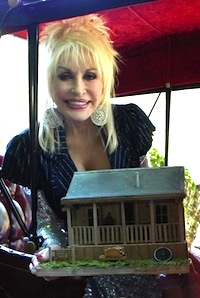
Dolly with a birdhouse replica of her famous Tennessee mountain home, a gift from the Lane twins. (Photo courtesy of the Lanes)
They won $50,000 on ABC’s “Wipeout” to finance their documentary and are trying to raise more for distribution. Visit kickstarter.com and look for “Hollywood to Dollywood” to help or watch the trailer. Their project also has a Facebook page. Several festival showings — at gay and general indie film festivals — are also on the calendar.
Larry says Dolly has strong gay appeal because she’s always been herself, which gays, he says, find inspiring.
“She’s never cared what people thought of her,” he says. “She’s always done her own thing. If people didn’t want to come out for Gay Day at Dollywood, she just says, ‘Well y’all have 364 days, come then.’ She’s always had that attitude. She just loves everybody. Every fan that’s ever bought a ticket from Baptist ministers to drag queens.”
Gordon agrees. He says gay rights issues are one of the few hot button political issues she’ll discuss.
“I think a large part of that came from her being under Sandy Gallin’s management in the ‘70s. They became the closest of friends and even shared an apartment together in New York. That friendship helped mold her into a gay rights advocate. By the mid-‘90s, she was saying things like she believed gay rights were human rights. She’s had friends and family members who are gay or bi and had staff members who’ve had gender reassignment surgery. She’s a very open, loving and accepting person and you can’t help but see that.”
Resnick says Dolly bucks the country trend when it comes to her pro-gay beliefs.
“Some country singers, the more quote-unquote Christian they are, the less accepting they are of gays and Dolly is just not like that. If you listen to her songs, there are a lot of mentions of God and it’s clear that’s very important to her, but it doesn’t seem to in any way affect how she feels about people’s rights to be who they are. She’s very embracing and has lots of gays around her. She clearly has no problem with it.”
Miscellaneous
Stephen Miller’s legal group sues Fairfax County schools
Lawsuit challenges policies for transgender, nonbinary students

Former Trump administration official Stephen Miller’s legal group on Tuesday filed a lawsuit against the Fairfax County School District over its policies for transgender and nonbinary students.
America First Legal in a press release notes it filed the lawsuit against the school district on behalf of a female, “practicing Roman Catholic” student “for allowing teenage boys to use the female restrooms and for forcing a radical, government-sponsored gender indoctrination and approved-speech scheme that discriminates against students on the basis of sex and religion and violates their free speech rights under the Virginia Constitution.”
The lawsuit was filed in Fairfax County Circuit Court.
The Virginia Department of Education last July announced new guidelines for trans and nonbinary students for which Republican Gov. Glenn Youngkin asked. Equality Virginia and other advocacy groups claim they, among other things, would forcibly out trans and nonbinary students.
Fairfax County schools are among the school districts that have refused to implement the guidelines.
“Fairfax County Public Schools appears to believe that its policies and regulations can override the Virginia Constitution’s protections for religious beliefs, speech and from government discrimination on the basis of sex and religious beliefs,” said America First legal Senior Advisor Ian Prior in a press release. “It is well past time for FCPS to stop sacrificing the constitutional rights of its students so that it can implement a state-sanctioned ideology that demands compliance in speech, beliefs and conduct.”
FCPS Pride, a group that represents the Fairfax County School District’s LGBTQ employees, described the lawsuit as “abhorrent.”
“We are confident that the school board and the superintendent will strongly and firmly oppose this specious suit and continue to support all students, including transgender and gender expansive students,” said the group in a press list.
Miscellaneous
More than a dozen LGBTQ candidates on the ballot in Va.
Control of the state Senate hangs in the balance
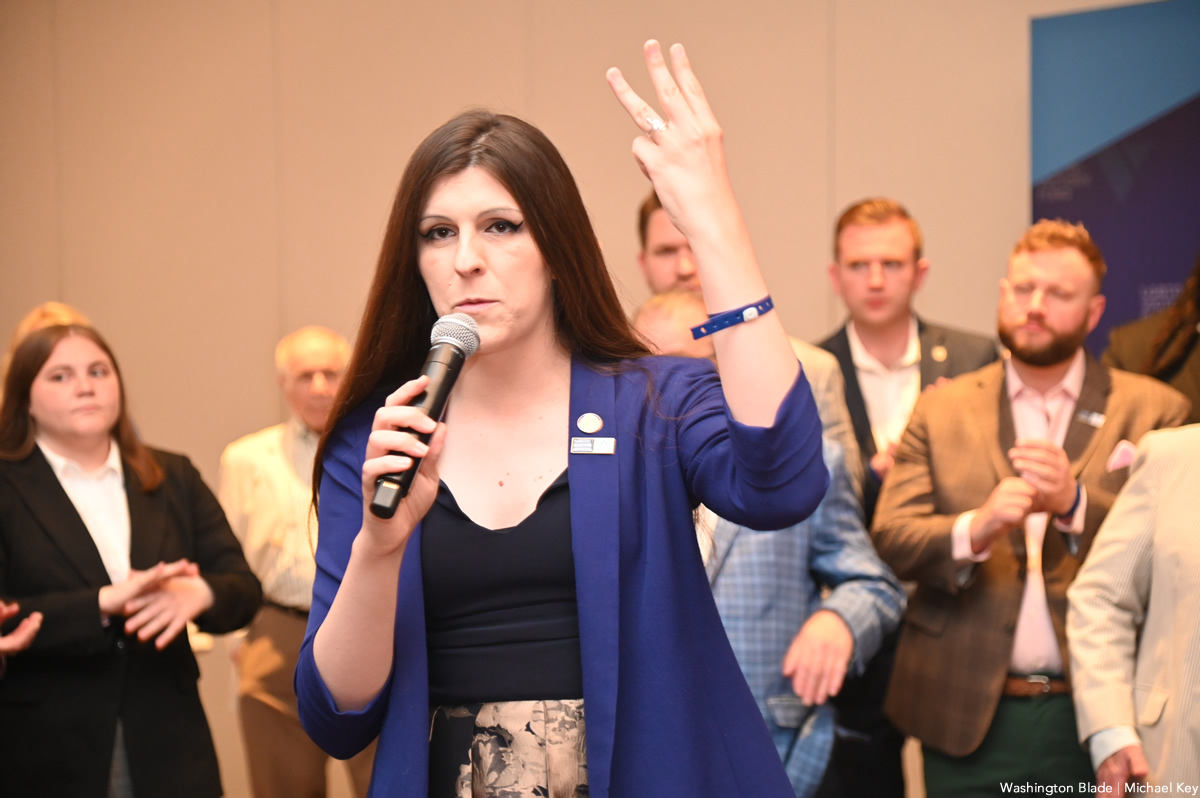
More than a dozen openly LGBTQ candidates are on the ballot in Virginia on Nov. 7.
State Del. Danica Roem (D-Manassas) is running against Republican Bill Woolf in the newly redistricted Senate District 30 that includes western Prince William County and the cities of Manassas and Manassas Park.
Roem in 2018 became the first openly transgender person seated in a state legislature in the U.S. after she defeated then-state Del. Bob Marshall, a prominent LGBTQ rights opponent who co-wrote Virginia’s constitutional amendment defining marriage as between a man and a woman. Roem would become Virginia’s first out trans state senator if she defeats Woolf.
Woolf supports a bill that would require school personnel to out trans students to their parents. The Republican Party of Virginia has highlighted this position in ads in support of Woolf.
“Thank you for reminding me why I won three elections in this district in Prince William County, which is the most diverse county in all of Virginia and the 10th most nationally where we welcome everyone because of who they are, not despite it, no matter what you look like, where you come from, how you worship, if you do, or who you love because you should be able to thrive here because of who you are, never despite it,” said Roem on Sept. 28 in response to a woman who heckled her during a debate with Woolf that took place at Metz Middle School in Manassas.
Gay state Sen. Adam Ebbin (D-Alexandria) is running for re-election in Senate District 39. State Del. Mark Sickles (D-Fairfax County), who is also gay, is running for re-election in House District 43.
Former state Del. Joshua Cole, who identifies as bisexual, is running against Republican Lee Peters in House District 65. State Del. Kelly Convirs-Fowler (D-Virginia Beach), who came out as bisexual last year at Hampton Roads Pride, will face Republican Mike Karslake and independent Nicholas Olenik.
State Del. Marcia “Cia” Price (D-Newport News), a Black woman who identifies as pansexual, is running for re-election in House District 85.
Adele McClure, a queer Democrat, is running to represent House District 2 that includes portions of Arlington County. Laura Jane Cohen, a bisexual woman who is a member of the Fairfax County School Board, is a House of Delegates candidate in House District 15.
Rozia Henson, a gay federal contractor who works for the Department of Homeland Security, is running in House District 19. Zach Coltrain, a gay Gen Zer, is running against state Del. Barry Knight (R-Virginia Beach) in House District 98.
LPAC has endorsed Jade Harris, a Rockbridge County Democrat who is running to represent Senate District 3. Harris’ website notes trans rights are part of their platform.
“Protecting trans rights, repealing right to work, strengthening unions and supporting our farmers are just a few of my legislative priorities,” reads the website. “I am dedicated to addressing the revitalization of our state’s infrastructure, fostering a favorable environment for job creation, and supporting our public education system.”
Republicans currently control the House by a 51-46 margin, while Democrats have a 21-19 majority in the state Senate.
Senate Democrats have successfully blocked anti-LGBTQ bills that Republicans have introduced since Republican Gov. Glenn Youngkin took office in January 2022.
The Virginia Department of Education in July released new guidelines for trans and nonbinary students that activists and their supporters have sharply criticized. They fear that Republicans will curtail LGBTQ rights in the state if they regain control of both houses of the General Assembly on Nov. 7.
“Time and time again, anti-equality lawmakers and the Youngkin administration have made it clear that they will continue to disrespect and disregard the lives and lived experience of LGBTQ+ people within Virginia,” said Equality Virginia PAC Executive Director Narissa Rahaman in August when her organization and the Human Rights Campaign endorsed Roem, Ebbin and other “pro-equality champions.”
“We must elect pro-equality champions who will secure and strengthen our freedoms,” added Rahaman. “We have that chance as the eyes of the nation are on us this November.”
The LGBTQ+ Victory Fund has endorsed Fairfax County School Board Vice Chair Karl Frisch and Fairfax County School Board candidates Robyn Lady and Kyle McDaniel, who identify as lesbian and bisexual respectively.
Michael Pruitt would become the first openly bisexual man elected to the Albemarle County Board of Supervisors if he were to win on Nov. 7. Blacksburg Town Councilman Michael Sutphin and Big Stone Gay Town Councilman Tyler Hughes, who are both gay, are running for re-election.
“Tyler will be a critical voice for equality as the only out LGBTQ+ person on the Big Stone Gap Town Council,” says the Victory Fund on its website.
Cal Benn contributed to this article.
Miscellaneous
What it means to be an active ally to your LGBTQ+ co-workers TEST
Five easy tips to help you avoid common risks
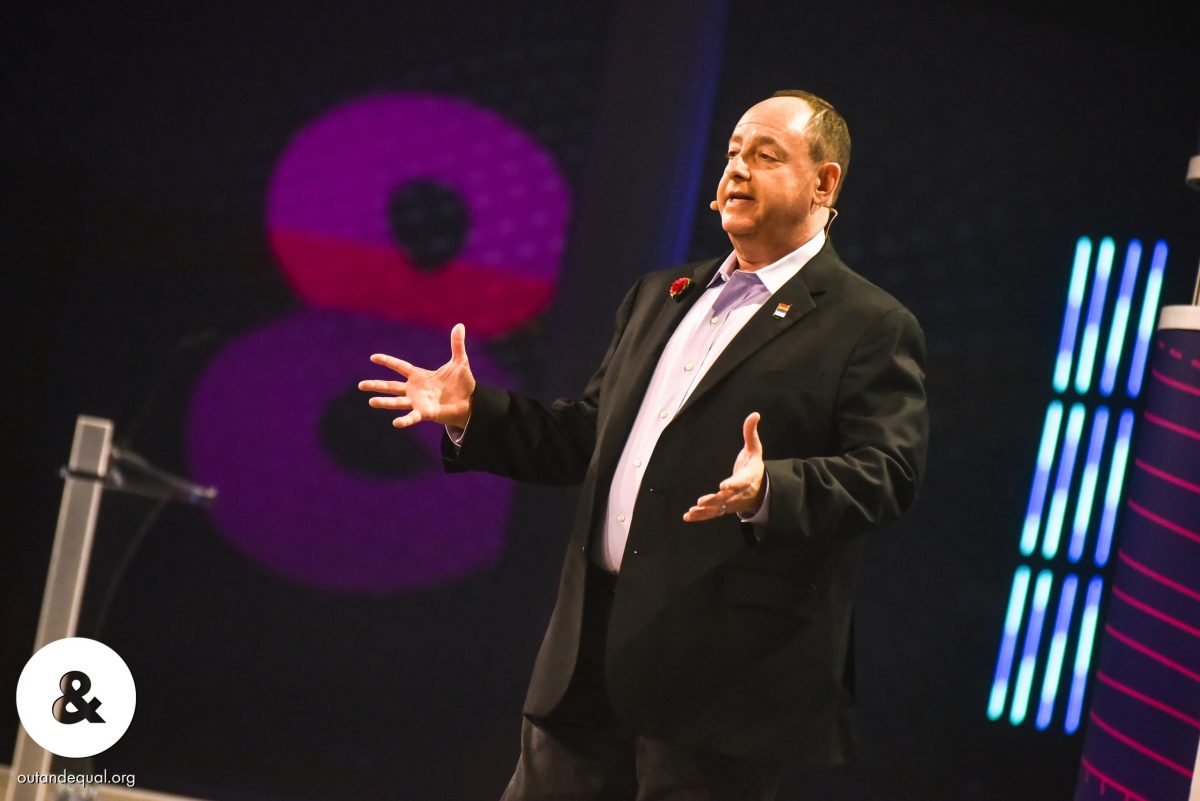
Your home is more than just a place to eat and sleep; it’s your safe haven. As much as you might cherish your home, you should probably also recognize the potential hazards within its familiar walls. Accidents can happen in an instant, yet with a little foresight and some simple adjustments, you can transform your house into a safer haven.
Accidents can happen anywhere, and with a few simple tweaks, you can lower risks in your space. Below you’ll find five tips for each room in your home to help prevent injuries, falls, and other mishaps. In short, home safety.
This article was inspired by a shower in a rental we managed that began leaking through the kitchen ceiling below. If only the landlord had installed grab bars, right!? Below, we’ll guide you through the steps to fortify your bathroom, making it a place of relaxation without the fear of slips and falls. Then, we’ll venture into the room where the magic happens, where proper planning can ensure great nights and peaceful mornings. We’ll show you how to prevent accidents while you experiment becoming the next Gordon Ramsey. And we’ll include a few surprising solutions for those other rooms that hold their own unique hazards, offering solutions to safeguard against unexpected mishaps.
Bathroom Safety
Install Grab Bars: Adding grab bars near the shower and toilet can provide essential support for family members of all ages. Not only can they help with getting in and out, but they can help provide stability when washing. Make sure they are securely anchored to the wall.
Non-Slip Mats: Place non-slip mats inside the shower and bathtub to prevent slips. They’re a small investment that can save you from falls and head injuries.
Adjust Water Temperature: Ensure your hot water is set to a safe temperature to avoid scalding. The hot water heater should be set to around 120°F (49°C)l, the middle setting on many water heater settings.
Medicine Cabinet Locks: If you have young children, use childproof locks on your medicine cabinet to keep harmful substances out of reach.
Proper Lighting: Ensure there’s adequate lighting in the bathroom to avoid trips and falls during nighttime visits. Nightlights can be a simple and effective solution.
Bedroom Safety
Clear Pathways: Keep pathways in the bedroom clutter free to prevent tripping. Ensure there’s enough space to move around comfortably, particularly getting around the bed. Be aware where all furniture is when walking around to avoid stubbed toes, particularly at night.
Secure Rugs: If you have throw rugs, use rug grippers or double-sided tape to keep them from slipping. Loose rugs are a common trip hazard.
Bed Rails: For anyone at risk of falling out of bed, consider installing bed rails to provide extra support and prevent falls.
Nightstands with Drawers: Opt for nightstands with drawers to keep essential items. This reduces the need to get out of bed at night, minimizing the risk of falls, as you race to grab what you need and not lose a moment’s rest.
Fire Safety: Install battery-operated smoke detectors in the bedrooms if there are none. Make sure to install them 36 inches away from an air vent or the edge of a ceiling fan. Also six inches away from the joint between the wall and ceiling. And test smoke detectors regularly.
Kitchen Safety
Non-Slip Flooring: Choose slip-resistant rugs in the kitchen, especially in areas where spills are common. Mats near the sink and stove can also help and you can often buy them fairly cheaply at Costco.
Childproof Cabinets: If you have little ones, use childproof latches on cabinets and drawers to prevent them from accessing potentially hazardous items.
Anti-tip brackets: Install an anti-tip bracket behind the range. These are often used when children are in the home. Although they are less likely to open the oven door and use it as a step stool to get to the stove-top, adults can also benefit from installing these.
Adequate Lighting: Proper lighting is crucial in the kitchen to avoid accidents. Under-cabinet lighting can illuminate work areas effectively.
Secure Heavy Items: Ensure heavy pots and pans are stored at waist level to prevent straining or dropping them from high shelves.
Sharp Object Storage: Keep knives and other sharp objects in a secure drawer or block. And handle all sharp items with extreme care, even when washing and drying. These steps reduce the risk of accidental cuts.
Other Safety Tips
Furniture Anchors: Secure heavy furniture, like bookshelves and dressers, to the wall to prevent tip-overs, especially if you have young children.
Adequate Outlets: Check for damaged outlets and replace them promptly. Avoid overloading circuits with too many devices. Install placeholder plugs in outlets to prevent young curious fingers (or tongues?) from going inside an electrical outlet.
Stair Gates: If your home has stairs, install safety gates at the top and bottom to prevent falls, especially if you have toddlers or pets to keep them off of the stairs when you cannot monitor them.
Emergency Escape Plan: Develop and practice an emergency escape plan with your family, including a designated meeting place outside.
Carbon Monoxide Detector: If your home burns any fossil fuels for heating or appliances, install carbon monoxide detectors in common areas of your home to detect this odorless gas. The D.C. building codes require this if you use a fireplace or if you have an attached garage. In essence, if there is any potential source of carbon monoxide in the home, be sure to install these detectors.
Remember, a safer home not only prevents accidents but also provides peace of mind for you and your family. Implement these simple tips to create a secure environment in every room of your house.
With these practical tips and a few adjustments, you can significantly reduce the risk of injuries and falls in your home. Enjoy peace of mind in your now much safer haven.
Scott Bloom is owner and senior property manager of Columbia Property Management.
-

 U.S. Supreme Court4 days ago
U.S. Supreme Court4 days agoSupreme Court upholds ACA rule that makes PrEP, other preventative care free
-

 U.S. Supreme Court4 days ago
U.S. Supreme Court4 days agoSupreme Court rules parents must have option to opt children out of LGBTQ-specific lessons
-

 Television4 days ago
Television4 days ago‘White Lotus,’ ‘Severance,’ ‘Andor’ lead Dorian TV Awards noms
-

 Music & Concerts5 days ago
Music & Concerts5 days agoBerkshire Choral to commemorate Matthew Shepard’s life

